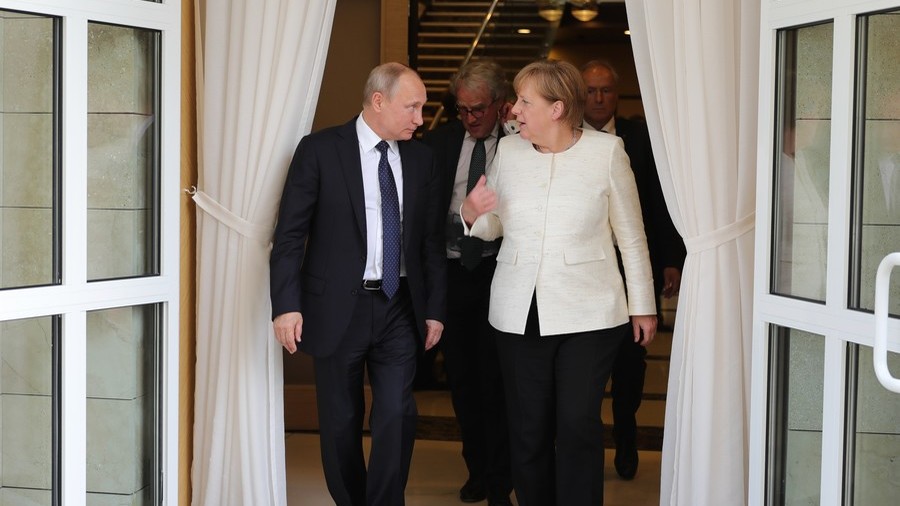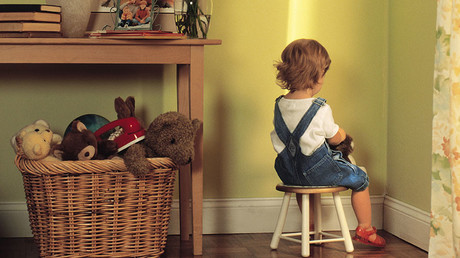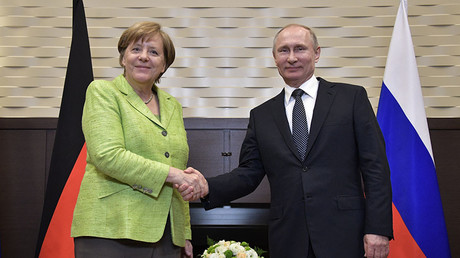Putin, Merkel discuss defense against Trump’s sanctions drive

Sanctions imposed by the Trump administration that could hurt companies in Germany and Russia were among the issues discussed by President Vladimir Putin and Chancellor Angela Merkel during their latest meeting.
Merkel arrived in the Russian Black Sea city of Sochi to meet Putin on Friday, around a year after her previous visit in 2017. Both leaders have had their mandates reconfirmed by their respective electorate since – Putin during the March election, which he won in a landslide, and Merkel after winning the September 2017 general election in Germany and, arguably more impressive, securing a coalition agreement after a daunting six months of negotiations.
The way Putin greeted Merkel may have reminded her of the coalition talks. After the agreement was finalized and she was finally elected chancellor by the parliament in mid-March, Merkel received flowers from fellow members of the coalition. Similarly, the Russian president also handed his guest a bouquet when meeting her on the porch of his residence in Sochi, before having a three-way chat with Prime Minister Dmitry Medvedev, whose cabinet reshuffle has just been completed.
While the two leaders had plenty of issues to discuss, from humanitarian aid and the political transition in Syria, to the crackdown on a Russia-linked news agency in Ukraine, the latest actions by the US were among the top priorities. President Donald Trump’s decision to break a nuclear deal with Iran by re-imposing economic sanctions poses a potential threat to European companies doing business in Iran.
Merkel said that the Trans-Atlantic partnership was valued by Berlin and that European nations are currently discussing ways in which the EU can provide a safety net to companies dealing with Iran. The German leader added she hoped Tehran would see the benefit of observing the terms of the deal despite Washington’s move.
European companies are similarly threatened by potential sanctions from the US over joint projects with Russia, particularly the Nord Stream 2 gas pipeline. Putin sarcastically remarked that the attitude to the project demonstrated by the Trump administration is a remarkable example of continuation of the policies adopted by his predecessor, Barack Obama.
“[What Washington wants Russia to do] is to support Ukraine, which doesn’t really want to develop its relations with us, but is very pleased to get our money for the transit of the gas. About two to three billion dollars a year,” Putin said. “We are not against it, in fact. We are ready to keep the transit, if it is economically feasible. This feasibility may be reached through negotiations.”
Nord Stream 2 will deliver Russian natural gas directly to Germany, the biggest buyer of the fuel in Europe. With the pipeline working, the demand for transit services from Ukraine and other Eastern European countries would be reduced accordingly. Kiev and other nations, which would lose out from the change, claim that the pipeline is a political project that doesn’t make commercial sense.
The US, which wants the EU to reduce the share of Russian gas it imports in favor of liquefied natural gas (LNG) produced in America, is threatening sanctions for European companies involved. “Donald is not just the president of the US. He is also a robust businessman, so he is furthering his business interests, I believe,” Putin explained, adding that American LNG is currently about 20 to 30 percent more expensive than Russian pipeline gas.
Merkel agreed that Nord Stream 2 is a commercial project, but said there were non-economic aspects in Ukraine transit and that Berlin wants to see that transit preserved.
Putin and Merkel expressed their nations’ commitment to the Minsk agreement, a roadmap towards peace for Ukraine, and said that a new meeting of the so-called Normandy format, which includes Ukraine, Russia, Germany and France, may soon be convened, but refrained from providing a timeline.
The Russian president also remarked on the reported recovery of Sergei Skripal, the double agent poisoned in Britain by what London claimed was a Russian military-grade chemical weapon. Putin said Skripal’s discharge from hospital was good news and that the lethality of the toxin that put him there was obviously exaggerated by the British government.



0 Comments:
Post a Comment
Subscribe to Post Comments [Atom]
<< Home